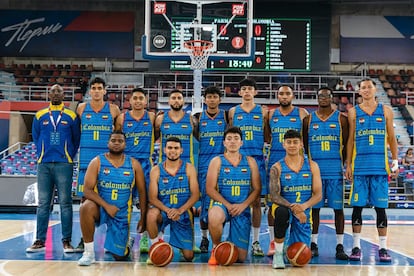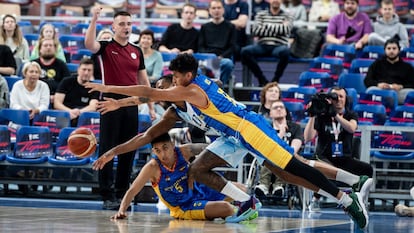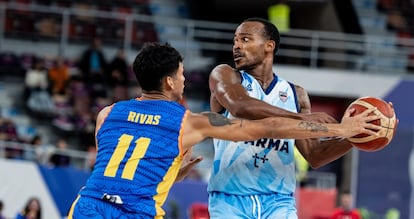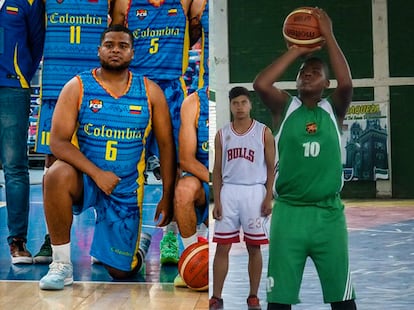The fake team that pretended to be Colombia at an international basketball tournament in Russia
A group of amateur players falsely posed as the official national team at a tournament held in Perm. They were discovered after being trounced and now the question is how they were able to hoodwink the Russian and Colombian federations, and why

It was clear something was wrong from the very first game. It was the start of an international basketball tournament, in a country that had been banned from participating in international competitions after its invasion of Ukraine: Russia. At the end of August, the Russian Basketball Federation (RBF) organized what it called the Friendship Cup in Perm, a city 18 hours from Moscow. A few international allies, including Venezuela and Colombia, confirmed their participation. But there was something off about the Colombian team. On August 21, in their opening game, they were crushed — as if they had never played before — by a local team, Parma, 155-53. “I have never won a game with a 100-point difference in my career,” said Samson Ruzhentsev, one of Parma’s players. In their next two games, the Colombians lost 108-53 against Venezuela and 99-63 against a youth team from Perm. On August 23, an explanation was published in the Russian media: this was not the official Colombian team. Although they were Colombian, they were amateurs who had only played in youth tournaments at their schools and universities, and who had deceived the RBF.
“At first, to be honest, when we received information via social media that there were some Colombians playing in Russia, we thought they were pulling a fast one,” the president of the Colombian Basketball Federation (FCB), John Mario Tejada, told EL PAÍS. When they realized it wasn’t a joke, the FCB published a statement saying they had never received a formal invitation from Russia to play in the tournament, nor did they give the players their endorsement to represent the country. “We don’t know those who took part; none of them have played in the professional league,” Tejada explains. The FCB has not contacted the fake players. EL PAÍS tried to speak to several of them, but received no response: they have remained silent since the farce was discovered.

The Colombian Federation has filed a criminal complaint for impersonation, and has reported the incident to the International Basketball Federation (FIBA). They have not spoken to their Russians counterparts directly, and the RBF has its own version of events: its president, Andrei Kirilenko, has said that they did make a formal invitation and received an official response from the Colombian Federation. “We will get to the bottom of how this happened,” Kirilenko told Russian media. For now, there has been speculation that the players hacked the Colombian Federation’s website or email account to send that official response.
Tejada, however, gives the hacking theory short shrift. “If an audit has to be done, then it will be done. But, to be honest, we have not lost control of our email, our website works fine, and the tournament invitation never arrived in our email. I would venture to say that they, those players, are impersonating us by inventing an email address.”

This assumption has also been reached by the Russian media, after seeing the supposed official letter received by the RBF. That communication, which confirms that a delegation of 20 Colombian players would travel to Russia, including several for whom the Russian government would pay for tickets and accommodation in a four- or five-star hotel, contains a suspicious contact email: lalasilveria23@gmail.com. As the Russian media discovered, this email address is used by a 25-year-old Colombian who studies civil engineering in the city of Kazan to make purchases at a supermarket.
Christian David Mosquera Durán, the online grocery shopper, is now at the center of the plot, both because of his email and due to of his residence in Russia. Born in Bogotá, he is an Afro-Colombian who has played in minor basketball tournaments at his university and who, as a teenager, participated in intercollegiate games as part of the team at a Salesian school called Centro Don Bosco. At least two of his teammates from the school, Ángel Herrera and Miguel Torres, were part of the fake Colombia team in Russia. They won a college championship in 2014, which remains a source of pride on Torres’ Facebook page.

EL PAÍS contacted Mosquera Durán and some of his acquaintances for this article, but did not receive a response. Their social media accounts show photos of young people passionate about basketball, friends for years united by their love of the sport. They have not explained their motivations to the press: whether it was money, just fun, or if there was another reason that motivated them to pass themselves off as part of an official team. A member of the FCB, who prefers not to give his name, speculates that the impostors “went to Russia to look for opportunities, and one understands, in part, that they wanted to show what they do, to compete, to play.” They tricked the Russian federation in order to wear a Colombian national jersey at least once in their lives — one that, incidentally, is not the official uniform of the Colombian Basketball Federation.
Tejada, in any case, regrets that the fake team is getting so much attention. “It’s a shame that news about basketball in Colombia is focused on a youthful prank when we’re on an upward trajectory in the sport, when we have beaten Argentina, Brazil, Mexico, Uruguay, all the South American powerhouses, when we have players in the best teams in the world. All of that is being overshadowed by what I think is a bad joke.” The Colombian women’s team, for example, has already won two games against Venezuela and Paraguay at the current South American championship in Chile; their success has not yet received the same attention as the fake team in Russia.
Sign up for our weekly newsletter to get more English-language news coverage from EL PAÍS USA Edition
Tu suscripción se está usando en otro dispositivo
¿Quieres añadir otro usuario a tu suscripción?
Si continúas leyendo en este dispositivo, no se podrá leer en el otro.
FlechaTu suscripción se está usando en otro dispositivo y solo puedes acceder a EL PAÍS desde un dispositivo a la vez.
Si quieres compartir tu cuenta, cambia tu suscripción a la modalidad Premium, así podrás añadir otro usuario. Cada uno accederá con su propia cuenta de email, lo que os permitirá personalizar vuestra experiencia en EL PAÍS.
¿Tienes una suscripción de empresa? Accede aquí para contratar más cuentas.
En el caso de no saber quién está usando tu cuenta, te recomendamos cambiar tu contraseña aquí.
Si decides continuar compartiendo tu cuenta, este mensaje se mostrará en tu dispositivo y en el de la otra persona que está usando tu cuenta de forma indefinida, afectando a tu experiencia de lectura. Puedes consultar aquí los términos y condiciones de la suscripción digital.









































